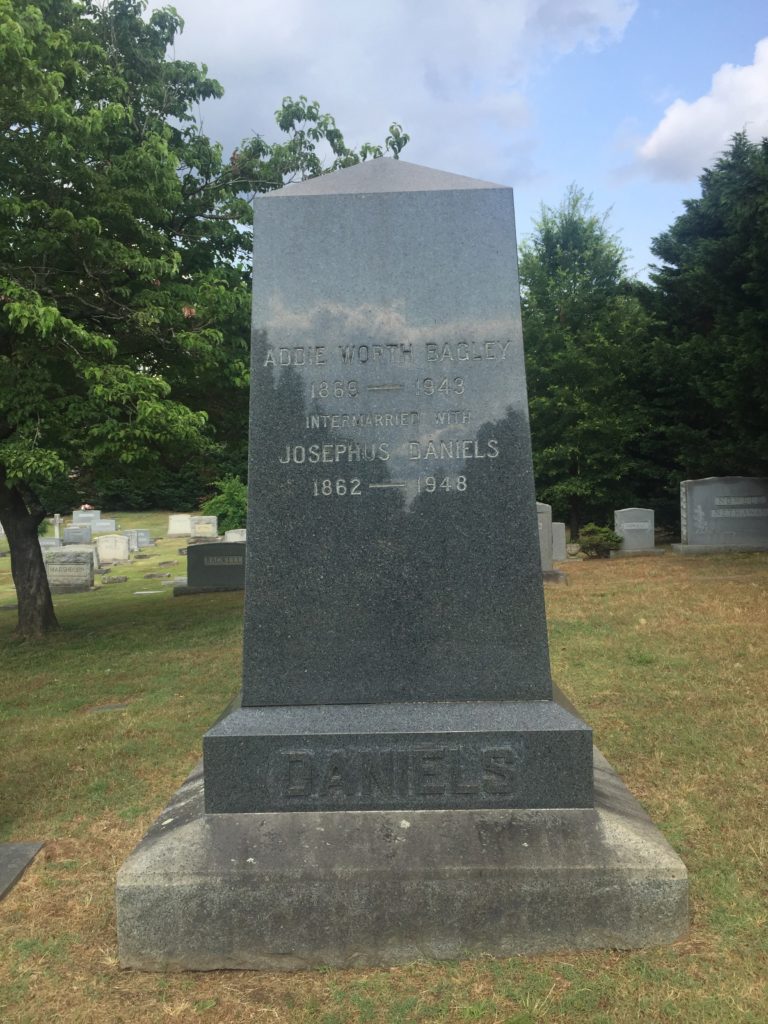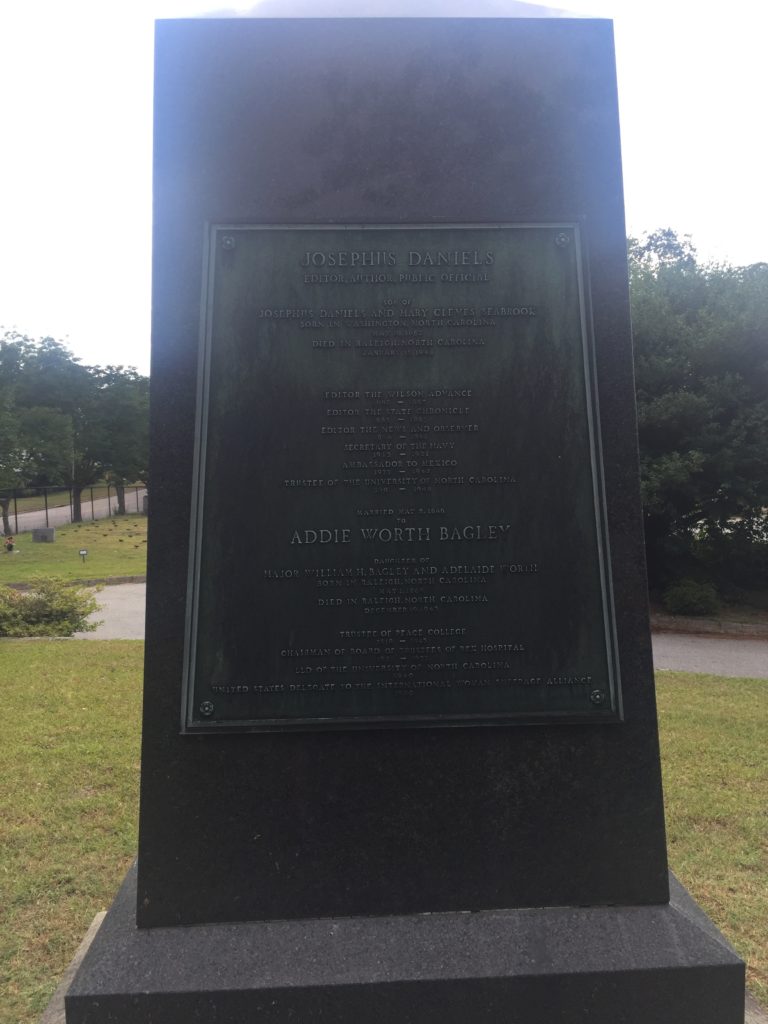Erik Visits an American Grave, Part 560
This is the grave of Josephus Daniels.


Born in 1862 in Washington, North Carolina, Daniels grew up without a father. He was killed in the Civil War, but as these things sometimes went, he was a Unionist and was killed by a Confederate sharpshooter as he was escaping Washington. I don’t know whether Daniels’ father was sympathetic to the plight of slaves or whether he was an Andrew Johnson-like white supremacist Unionist, but in any case, Daniels definitely did not pick up on his father’s anti-Confederate tendencies.
Daniels went to college at what is today Duke University and then became a newspaper editor. He studied law at the University of North Carolina and was admitted to the bar in 1885 but he never practiced. Instead, he became the North Carolina Democratic Party’s chief newspaper man. This was during the horribly named period of “Redemption,” meaning the return of white supremacist government by violent means, evicting former slaves and their white sympathizers from office and often from life. He was a “New South” type, one who connected white political power with forward-looking business development. On some issues, he was fairly progressive, such as railroad regulation and anti-trust laws. He was the state printer from 1887-93 and then got a nice patronage position when Grover Cleveland became president, as chief clerk of the Department of the Interior, which he held until 1895.
Daniels was all-in for white supremacy. He was a frothing racist editor whipping up violence against African-Americans. In 1894, an industrialist named Julian Carr bought the Raleigh News & Observer and installed Daniels as editor. To quote Daniels from his own autobiography, “The News and Observer was relied upon to carry the Democratic message and to be the militant voice of White Supremacy, and it did not fail in what was expected.” Indeed it did not.
See, in Wilmington, North Carolina, an interesting experiment was taking place. That city had a genuinely bi-racial government. The blackest city in the state, even after Reconstruction, African-Americans held onto power because of anger from white cotton farmers over the powers of railroads in the Gilded Age. This was the best of the Populists in action. Whereas that movement often fell apart quickly, with many of its proponents being spewing racists, in Wilmington, it held together for a long time. For Josephus Daniels, this was unacceptable. So he personally whipped up race hatred and a riot to take back the city for the White Man. That March, he met with the head of the state Democratic Party, Furnifold Simmons, in a Raleigh hotel room, to plan a coordinated strategy. They found speakers who would go around the state, racebaiting and whipping up white supremacist hate. At these rallies, Daniels would follow with racist handbills, cartoons, and other forms of propaganda intended to whip up anti-black violence. In November, Daniels and friends had their plan come to fruition. A riot created what was basically a coup in Wilmington. About 2,000 whites gathered at the Wilmington courthouse and engaged in a violent overthrow of the black community. Up to 60 African-Americans were killed and the infrastructure of black political life, including newspapers, was destroyed with the black leaders fleeing for their lives. White supremacy would rule Wilmington.
One might think this would make Daniels at least somewhat embarrassing for national Democratic leadership. Nope. Daniels remained the leading Democratic newspaper editor in North Carolina. When Woodrow Wilson was elected, Daniels became Secretary of the Navy! He served the full two terms in that role, from 1913-21. That meant he was the boss of Assistant Secretary of the Navy Franklin Delano Roosevelt. They became fast friends. As Secretary of Navy, Daniels did a bunch of stuff. For one, he believed that the military should control radio broadcasts and wanted all amateur radio broadcasting ended and all radio transmitters owned by the government. He didn’t win that battle. He did win creating prohibition for the Navy, which I’m sure the sailors really appreciated…. He also created a five-mile prostitution ban around all bases. In New Orleans, this led to the closing of the Storyville red light district in 1917, which I didn’t know when I wrote the This Day in Labor History post about it years ago.
Daniels also ended all work for the Navy on Sunday, not to give the boys a day off but so to respect the Sabbath. He also promoted naval aviation during World War I and established the first naval air station in Pensacola. He and FDR also created the infamous Newport sex sting, which set up sailors to get busted and prosecuted for homosexuality when they were in Rhode Island. It was so over the top and such entrapment that both Daniels and Roosevelt were rebuked by a congressional committee for their reprehensible behavior, and not by a Congress that was sympathetic to homosexuality. It’s interesting that given the recent success of the gay rights movement that FDR’s horrifying involvement in this is not at all known by the general public.
When Republicans took office in 1921, Daniels returned to Raleigh and took his paper back over. He did that until 1933, continuing to support his beloved white supremacy. But when his bud FDR became president, Daniels was back in the government. Roosevelt named him Ambassador to Mexico. In fact, Roosevelt had a habit of naming his favorite white supremacists to key international positions, such as Claude Bowers, publicizer of white supremacist Civil War and Reconstruction history, to Spain. Daniels actually wasn’t bad in the position. Despite his racism, he implemented FDR’s Good Neighbor policy there, which included not responding with violence when Lazaro Cardenas nationalized the oil industry in 1938, infuriating American oil companies. Moreover, there was some irony here because Daniels was the one who had ordered the infamous American occupation of Veracruz and bombardment of Tampico in 1914, which sticks in the craw of Mexicans to the present. He remained in Mexico City until 1941, significantly improving U.S.-Mexico relations during those tumultuous times, which also included putting support behind Mexican institution building and joining with Mexico in at least tacitly supporting the Spanish government against Franco. I guess right-wing coups are only appropriate in North Carolina.
He returned to Raleigh for retirement, wrote another book on his work in the Wilson years that was published in 1944 (he had an earlier one in the 20s) and wrote a five-volume (!) autobiography in which he sort of regretting the violence of Wilmington but not really. He died in 1948.
Josephus Daniels is buried in Oakwood Cemetery, Raleigh, North Carolina.
This grave visit happened because you donated to make this series happen. I hope it was a good investment for you. If you would like this series to cover other white supremacists of the period, you can donate to cover the required expenses here. Tom Watson is in Thomson, Georgia and Pitchfork Ben Tillman is in Trenton, South Carolina. Previous posts in this series are archived here.
